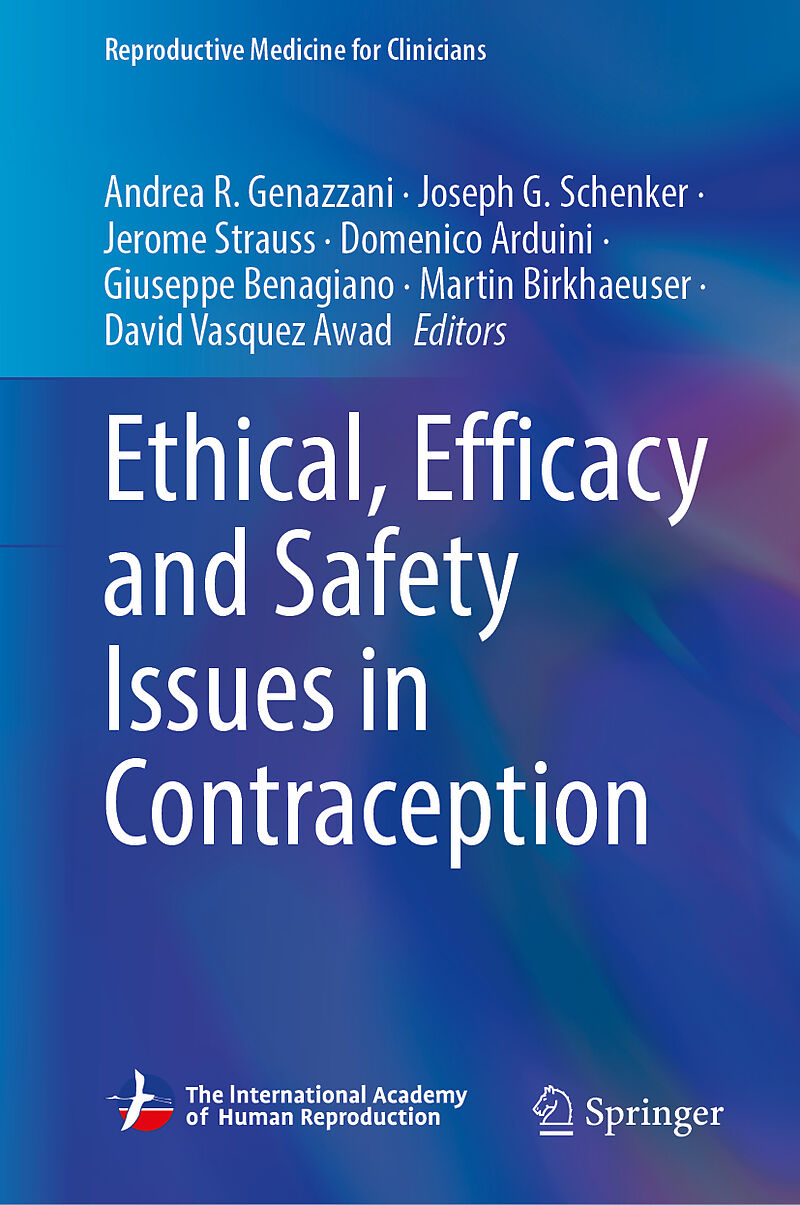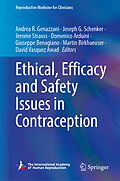

Ethical, Efficacy and Safety Issues in Contraception
Beschreibung
This new book in the series focuses on the complexities of contraception, covering the latest advancements and controversies in the field, and offers a comprehensive exploration of the ethical, medical, and practical dimensions of contraception in modern heal...Format auswählen
- Fester EinbandCHF 196.15
Wird oft zusammen gekauft
Andere Kunden kauften auch
Beschreibung
This new book in the series focuses on the complexities of contraception, covering the latest advancements and controversies in the field, and offers a comprehensive exploration of the ethical, medical, and practical dimensions of contraception in modern healthcare.
It provides diverse perspectives on reproduction, including religious and cultural viewpoints, and valuable insights into natural methods of family planning. The fundamental principles and effects of hormonal contraception, from molecular mechanisms to cardiovascular safety, are given enabling informed decision-making in clinical practice.
This book navigates the nuanced considerations for contraception at various life stages, from adolescence to perimenopause, and explores the intricacies of combined hormonal contraception and its impact on health. Individual risks and metabolic effects are discussed, empowering the reader to tailor contraceptive strategies to suit the unique needs of each patient.
Written by leading experts in the field, this book serves as an indispensable resource for navigating the current multifaceted landscape of contraception in clinical practice, and a valuable resource for gynecologists, obstetricians, endocrinologists, general practitioners and all specialists dealing with reproductive health.
Autorentext
Andrea R. Genazzani, is a distinguished expert in Obstetrics, Gynecology, and Endocrinology. He graduated in Siena University (1966), later specialized in Ob&Gyn and Endocrinology, and PhD in Clinical Biochemistry from Lausanne University (1972). He was Director of Ob&Gyn departments at the Universities of Cagliari, Modena, and Pisa. Holder of 6 Honoris Causa Laurea, and 1 Professor Emeritus, Fellow of both the Royal and American Colleges of Obstetricians and Gynecologists, member of the Académie Royale de Médecine of Belgium. He is currently President of the International Academy of Human Reproduction and Executive Director of the International Society of Gynecological Endocrinology. He was President of the IMS (1999-2002) and ESG (2009-2025). An influential editor and prolific researcher, author of 865 papers, editor of > 50 books, shaping the field of gynecological endocrinology worldwide.
Joseph Schenker, Prof. and Chairman Obstetrics Gynecology Hebrew University, Hadassah Medical Centre Jerusalem, Israel. President of International Academy of Human Reproduction 1996- 2023, Honorary Citizen of the City of Jerusalem. Elected by State of Israel to Light Torch Independence Day on Behalf of Medicine and Science. Chaired Ethical Committees of FIGO IFFS, ISIVF. Past President Israel Society of Obstetrics and Gynecology. Honorary Fellow of the American College of Obstetrics and Gynecology, Royal College, German, Polish, Romanian, Hungarian, Macedonian, Slovak Republic, Brazilian, and Israeli Societies of Obstetrics and Gynecology.
Jerome F. Strauss, is Emeritus Prof. of Obstetrics and Gynecology at the Perelman School of Medicine of the University of Pennsylvania. He was Executive Vice President for Medical Affairs and Dean of the Virginia Commonwealth University School of Medicine. He is a member of the U.S. National Academy of Medicine. Other honors include the Arnaldo Bruno International Prize in Gynecology from the Accademia Nazionale dei Lincei, the Research Award from the Society for the Study of Reproduction, the President s Achievement Award, Distinguished Scientist Award, an
Inhalt
Introductory Remarks (Preface).- FIGO Welcome Remarks.- Part 1: Ethical and religious issues related to reproduction control and Women s health.- 1. Jewish Law (halakha) and Reproduction.- 2. The regulation of conception in the field of tension between responsible parenthood and socioecological sustainability: a theological ethical approach.- 3. 'Be fruitful, and multiply ? Contraception in a Protestant Theological Perspective.- 4. Islamic Law and Reproduction.- Part 2: Natural methods of contraception and family planning.- 5. Ovulation, the in intersection in Hormonal Contraception.- 6. Fertility Awareness Based Methods and the history of FABMs.- 7. Fertility awareness-based methods: new technologies and acceptability in 21st century.- Part 3: Hormonal contraception: principle, molecules route of administration, liver effects and arterial safety.- 8. Female Hormonal Contraception: Principles and Molecules.- 9. Different methods and routes of administration of hormonal contraception.- 10. Impacts of hormonal contraception on liver.- Part 4: Combined hormonal contraception: effects on veins, endometriosis, adenomyosis, myoma, bone and collagen.- 11. Cardiovascular Safety: The Point of View of the Veins.- 12. Effects of combined hormonal contraceptives on bone and collagen.- 13. Hormonal treatments for endometriosis, adenomyosis and fibromatosis.- Part 5: Combined hormonal contraception effects on polycystic ovary, breast, breast cancer and other cancer patients.- 14. Metabolic effects of combined hormonal contraception and their use in Polycystic Ovarian Syndrome.- 15. Hormonal contraception: breast and breast cancer.- 16. Hormonal contraception and cancer.- Part 6: Progestin only contraception.- 17. Progestin Only Pills.- 18. Intrauterine Devices: Efficacy and Risks.- 19. Subcutaneous Implants and Intramuscular Injections.- Part 7: Other aspects of hormonal contraception in women and men.- 20. Quality of life and sexuality in women using hormonal contraception.- 21. Emergency contraception: mechanisms of action, efficacy, and risks.- 22. Reversible male contraception: new technologies and prospective.- Part 8: Hormonal contraception and medical benefits.- 23. Abnormal uterine bleedings and the approach with hormonal contraception.- 24. Benefits of hormonal contraception administration for menstrual cycle disorder.- 25. Combined hormonal contraceptives, migraine and effects on brain and mood.- 26. The importance of individual choice.- Part 9: Barrier methods: a useful tool in the prevention of sexually transmitted diseases.- 27. Barrier methods: a useful tool in the prevention of sexually transmitted diseases.- Part 10: Contraception at Different Stages of Life.- 28. Contraception at different stages of life: post-partum and lactation.- 29. Contraception at different stages of life: premature ovarian failure and perimenopause.- Part 11: Violence against women and contraceptive rights.- 30. Violence Against Women and Contraceptive Rights.- 31. Sexual Violence, Dignity, and Contraception.
